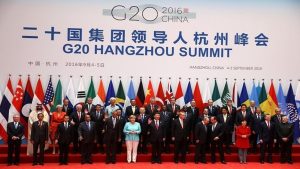
Group of Twenty Summit at its Eleventh Session Hangzhou City, China 2016
Prof. Dr. Moustafa El-Abdallah Al Kafry
Group of Twenty Summit at its Eleventh Session Hangzhou City, China 2016
Prof. Dr. Moustafa El-Abdallah Al Kafry
Introduction
The global economy is at a critical juncture with the anticipation of another new technological and industrial revolution, and IMF President Christine Lagarde warned that the world is facing a toxic mixture of slow, long-term growth and growing inequality between individuals in one country as well as between countries, which creates political tendencies towards populism and increased trade barriers. The International Monetary Fund warned ahead of the opening of the G-20 summit that it may have to cut its forecast for the level of growth of the global economy once Other this year. The IMF lowered its forecast for economic growth following Britain’s vote to leave the European Union to 3.1 percent in 2016 and 3.4 percent in 2017.[1]
The activities of the G20 summit at its eleventh session kicked off on Sunday September 2016 in Hangzhou, China, under the title: “Towards an Innovative, Fresh, Interdependent and Inclusive Global Economy”, and the leaders of these countries seek to develop a specific formulation to face the global economic crises, especially the decline in global economic growth and the high debt ratio of many countries of the world (including some G20 countries) to the highest level in 2015, as well as the decline in oil prices. In his speech opening the twentieth summit, Chinese President Xi Jinping urged the two conferences to avoid “empty talk” if they were looking to accelerate economic growth rates.
In 2009, a year after the global financial crisis, the International Monetary Fund warned that the crisis could hinder the growth of the global economy for at least the next seven years. Because banking crises have a long-term impact on the level of global GDP, despite the possibility of resuming growth even at low rates, and lower levels of employment, investment, and productivity all contribute to significant losses to global GDP. [2]
The IMF report also noted that there have been 88 banking crises over the past four decades covering most of the world. Global GDP losses in the medium term were the result of major banking crises. Although the continued impact of banking crises is a long time resulting from a decline in production, followed by weak investment, high unemployment and high inflation rates at the global level.
Eurozone economies declined and contracted by 0.2 percent in 2008 due to the global financial crisis, and the data indicated that the economic performance in the eurozone was weaker than in the United States, whose economy contracted by 0.1 percent and recorded weak annual growth of 0.8 percent. The global financial crisis was the main cause of the contraction of the region’s economies, the predominance of the recession and the decline in economic growth rates in the largest and third largest economy of the eurozone (Germany and Italy). France, the euro zone’s second-largest economy, avoided recession and posted slight growth of 0.1 percent. The U.S. economy — the world’s largest economy — was expected to contract by 2.7 percent in 2009 before rebounding by 1.5 percent in 2010. [3]
Does the G-20 summit have the potential to offer solutions to the global economic situation?
[1] – Obama stressed prioritizing free trade talks between the United States and the European Union ahead of talks with Britain.
http://www.bbc.com/arabic/business/2016/09/160904_g20_leaders_discuss_economy
[2] – The report of the World Monetary Agency, issued in conjunction with the annual meeting of the International Monetary Fund in December 2009 in Istanbul, Turkey.
[3] – Dr. Mustafa Al-Abdullah Al-Kafri, calls for reform in the G-20 countries to avoid the global financial crisis. Italy’s economy contracted 0.5 percent in the third quarter of 2008, Italian official data showed, beating expectations to enter its deepest recession in a decade.
PDF complete research download link:
Group of Twenty Summit at its Eleventh Session 2016
Group of Twenty Summit at its Eleventh Session
Hangzhou City, China 2016
Towards an innovative, revived, interconnected and inclusive global economy
Prof. Dr. Moustafa El-Abdallah Al Kafry
Contents
I – Reasons for the establishment of the Group of Twenty: 4
II – The G-20 Summit at its 11th session in Hangzhou, China: 5
2 – Can the leaders of the Group of Twenty improve the results of globalization? 7
3 – The incident of the absence of the red carpet at the reception of the US President: 8
4- The Syrian crisis on the schedule of leaders’ meetings at the Summit of the Twentieth Century: 9
III – China plays a more important role in the global economic system: 10
IV – What have the past summits of the leaders of the Group of Twenty States achieved? 12
V – Reducing dumping in the steel market and countering protectionist policies: 14
VI – Calling for greater flexibility in monetary policies: 15
VIII – Transatlantic Trade Agreement between the United States of America and the European Union: 18
IX – Better coordination of international efforts to address the refugee crisis: 18
X – Final communiqué of the G-20 Summit: 19
